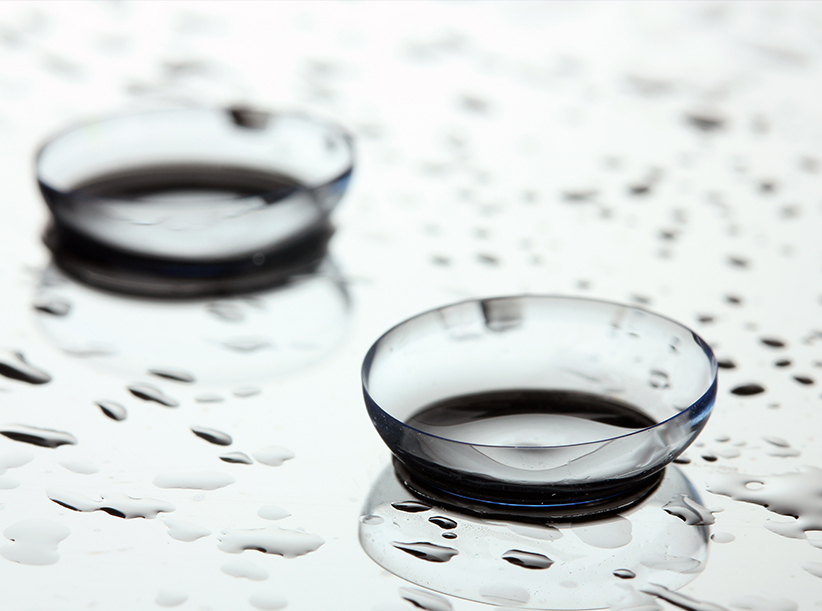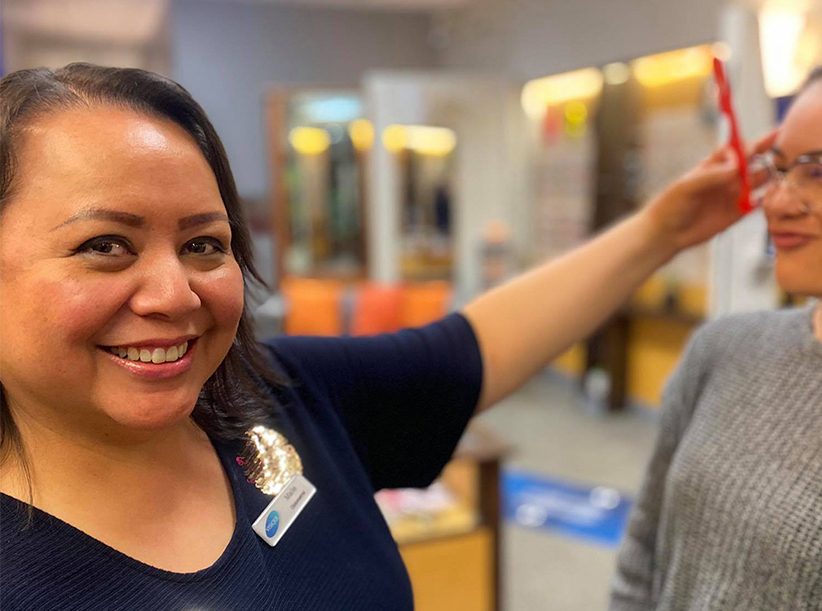A Complete Guide to Contact Lenses

If you’re new to contact lenses, it can be a confusing space to wrap your head around. Who cannot wear contact lenses? Who can? When and for how long? You might have questions around the process required to get them, or be wondering ‘is it ok to wear contacts every day?’. With so many questions, glasses can seem like a much simpler option! Fortunately, contact lenses are much easier than they seem. With the right guidance from your optometrist and instructions on how to use them, you’ll be able to discover a lifetime of better vision. Then you can have the best of both worlds - glasses and contact lenses.
So, whether you’re about to begin your contact lens journey, or are simply curious for more info, read on. We’ll cover off some often-asked questions to help you see the world of contacts a bit more clearly.
Is it necessary to consult an optometrist to use contact lenses?
Contact lenses are medical devices. They need to be fitted properly, provided with proper care instructions and should only be worn as prescribed by your optometrist. Because of this, it’s essential that you visit an optometrist for an eye examination to see if contact lenses are the right fit for you.
Can I get contact lenses the same day after an eye test?
This will need to be discussed with your optometrist. Whilst we do have some contact lenses on hand, in some cases we need to order in contact lenses for you.
Do all optometrists give you a trial pair of contact lenses?
After your initial eye exam, a trial pair of contacts is essential. From seeing how comfortable they are for your eyes, to ensuring they’re the right option for you, a trial is a great way to become accustomed to your new lenses. While this may vary between clinics, we’re proud to offer our customers a trial pair of contacts at Eye Spy, ensuring you’re confident they’re the right fit for you.
Can I wear contact lenses at the age of 14?
Many people wonder at which age children can start wearing contact lenses. There is no set defined age. As long as your child feels comfortable and is mature enough to understand good hygiene etiquette, they may be a good candidate for contact lenses.
Why are extra appointments required for contact lenses?
If you want to wear or try contact lenses, there are additional aspects we need to check, on top of the standard eye examination. This is due to the unique fitting contact lenses require, as our optometrists need to evaluate which option is best for you. From here, your optometrist can prescribe the right contact lenses for your eyes. Getting this fit right is essential, as unlike standard glasses, contact lenses sit directly on the surface of the eye. Without the right fit, these can damage the cornea or cause irritation.
With your preferred contacts fitted, you’ll typically trial these for a set period, then return for a follow up examination to ensure you’re happy and that the experience is a positive one. We will also check to see if any minor adjustments need to be made before we order your supply of contact lenses.
Will I experience discomfort with wearing contact lenses?
This is much less common now, with manufacturers producing contact lenses from more advanced materials that are more breathable and comfortable than older types. Experiencing discomfort during wear can be due to many factors. Factors range from the lens fitting, wettability of the material to the environment, and how you handle them.
The first step to ensuring contact lenses are as comfortable and irritation-free as possible is your initial examination. Your optometrist will provide you with the best possible fit, care and use instructions for your eyes. Should any irritation occur, you’ll be able to check with your optometrist to understand why, and learn how this can be reduced or avoided with some small modifications to your contact lenses, or routine.
How to decide which brand of contact lenses are best?
The right contact lenses will come down to various factors, from when and how long you will be wearing them, to your vision requirements. Fortunately, we stock an extensive range of leading brands to cater for everyone’s needs. Finding the right pair for you is pretty simple.
Can contact lenses be dangerous to eyes?
Rest assured, if used appropriately, contact lens use is safe. The risk increases when proper contact lens use guidelines are not followed. As it sits on your eye surface, improper use can reduce oxygen transfer to your eyes, cause irritation or expose your eye to infectious microorganisms.
By following the sanitary measures and sticking to the prescribed wear schedule, you can rest in the confidence that your eyes are safe and sound.
How do I insert and remove contact lenses?
Wondering how to put in contact lenses? At Eye Spy, we will spend time with you showing you how to safely insert and remove contact lenses to ensure you feel confident in handling contact lenses on your own.
Four simple steps are all that’s required to insert your contact lenses.
Wash hands
Before you start, ensure your hands are clean, washed with antibacterial soap, then dried thoroughly.
Check the lens is not inside out
Put the lens on the tip of your finger and hold it to the light. If the edges flare out, it’s inside out. Some lenses may have a number indicator to help, but it should look like a bowl, with straight edges.
Open your eye
With your lens orientated correctly, gently hold your upper eyelid open with one finger, and pull down the other eyelid with another. Do this carefully. Keep your other eye open as well.
Apply the contact lens
Carefully place the contact on your eye, looking upward as you do. Slowly release your eyelids, then close your eye and let the lens settle. Repeat on the other eye.
How often do I replace contact lenses?
This will depend on the type of lenses you use. Daily disposable lenses are for single day use. Fortnightly and monthly replacement options are also available. These replacement options involve contact lenses sitting in a solution overnight, along with cleaning them daily.
What cleaning solutions are best for contact lenses?
The best cleaning contact lens solution will be the one prescribed by your optometrist, for your unique lenses. This is essential, as there are different cleaning solutions with different applications, from saline solutions to hydrogen peroxide, daily cleaner and multipurpose solutions.
Use the solutions recommended by your optometrist and you’ll be caring for your lenses as best you can.
Do contact lenses and glasses give the same vision?
We’re often asked, are contact lenses better than glasses? Vision can vary between spectacles and contacts as the prescription is not always the same. Occasionally the vision could be better in contact lenses compared to glasses for certain eye conditions, like keratoconus or pellucid marginal degeneration. This is why an eye examination is essential. Your optometrist will ensure you’re using the best possible solution for your unique needs.
How often should I get my eyes examined if I am a contact lens wearer?
How often your eyes need to be examined depends on a number of factors, from your age, to the status of your vision and overall health. You should see your optometrist as frequently as advised by them, particularly if you are a wearer of contact lenses. This is usually every 12 months.
Can I swim in contact lenses?
No. There is a risk of infection, from bacteria and waste present in the water. When water gets into the eyes, bacteria and waste can attach to the contact lenses. A good option is to consider prescription swimming goggles or prescription dive masks.
Why can’t I buy contact lenses based off my spectacle prescription?
Because contact lenses sit directly on the eye, they behave differently to glasses. Hence, the optometrist needs to work out the suitable contact lens prescription and best contact lens material and fit. There are additional specifications which don’t apply to glasses.
If I get contact lenses, do I still need glasses?
Yes, as fully relying on contact lenses is not ideal. For example, there may be days where your eyes are more irritated or dry, requiring a short break from contact lenses.
Can I get coloured contact lenses?
Yes, it’s possible to get contact lenses in different colours. This is possible with zero prescription, in other words, no vision correcting component built in. They are still treated and handled like any other contact lenses; hence you still need to undergo the proper fitting process. Your optometrist will be able to determine whether your prescription is available in coloured contact lenses.
We hope we were able to answer some of your basic questions around contact lenses. We understand it can be a daunting space at first, but our clients at Eye Spy often tell us they wish they’d tried contacts sooner when they discover how simple and life-changing they can be.
If you have any more questions, or are curious about whether contact lenses may be right for you, give us a call, or drop in to see us at Eye Spy. We care for patients with a variety of different needs from our Palmerston North optometrist clinic, and are proud to provide the highest level of professional optometry. We’d love to answer any queries or concerns and help you to discover a lifetime of better vision.
